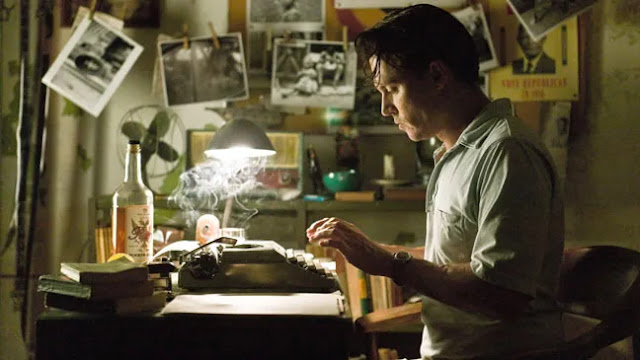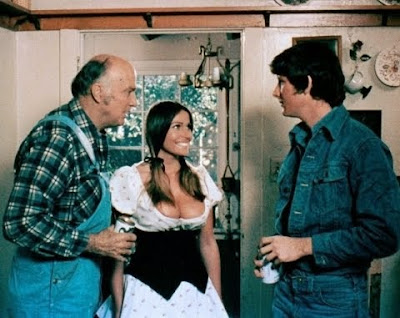The Rum Diary
The last time Johnny Depp played Hunter S. Thompson, imaginary bats were pummeling windshields and primates were hanging from rotating hotel bars. There was a fair amount of vomit, too. As a younger version of the famed journalist, here called "Kemp", Depp is first seen gazing out a window into brilliant sunlight with a half closed eye with red sclera and tousled hair. Here begins last year's THE RUM DIARY, a haphazard journey through Puerto Rico in 1960 that is not fueled by mesacline and the like as in FEAR AND LOATHING IN LAS VEGAS (1998), but considerable amounts of rum and beer. There is some vomit.
There's also one scene where a mysterious eye drop tincture causes Kemp to see his colleague/friend's tongue elongate to frightening proportions, but it's only one scene. Well, there's also a quite symbolic moment when Kemp (again under the influence) stares at tank full of lobsters that will lead viewers fond of subtext and deep interpretation to draw all manner of social and political conclusions.
But at this stage in his life, Thompson apparently hadn't grown fond of the really hard stuff yet. In fact, his friend and newspaper colleague Bob (Michael Rispoli) would even utter at one point: "You fool! You're high! Drink more rum!" Such a line seems right at home in a film directed by Bruce Robinson, who most famously oversaw the alcoholic mini-epic WITHNAIL & I some 25 years earlier.
Robinson also co-wrote the screenplay, based on Thompson's only fairly recently published novel. The journalist saw something of a narrative in his ether soaked memory, a relevant tale of the evolution of a writer who arrives to report for a small time paper in the sunny paradise of San Juan. He's entirely aimless and adrift, interested in little but the next drink.
After sleeping with the enemy, he begins to find a voice. Perhaps still with intoxicated faculties, but a voice nonetheless, a purpose. Finding a purpose and a voice does not merely come from lying supine and watching imaginary dragons.
In THE RUM DIARY, Kemp earns his cigarette choked time behind the typewriter after staring into the maw of human selfishness, perhaps in some ways mirroring his own. How sobering.
The enemy is a clean cut, real estate sharpster named Sanderson (Aaron Eckhart), who offers Kemp an assignment to write whitewashed propaganda detailing the erection of a mega hotel/resort. In Sanderson is an embodiment of the Rich Capitalist, bent on exploiting the land for commerce while the locals remain destitute. A duplicitous crook who may well eventually remind Kemp of Richard Nixon, who is seen on TV in one sequence as he debates JFK. Faithful Thompson followers know that the author had a white hot distaste for the later President.
We get a good read on Sanderson, with his careful speech and similarly slippery friends (other Americans with deep pockets and vested interests). He even has a diamond studded turtle, a perfect symbol of opulence, that crawls across his polished beachfront palace. But THE RUM DIARY also includes what I consider a gratuitous scene, as Sanderson berates and chases a pair of natives off his private beach. We did not need this confirmation of the man's bankrupt soul. His words are enough. He baldly describes Puerto Rico as a land ripe for the exploiting, a place that is reward for the calculating businessman, not those born there.
He also delivers the great line: "Humans are the only creatures on earth that claim a God and the only living thing that behaves like it hasn't got one."
Sanderson may be a greedy son of a bitch, but he's not entirely delusional.
In my opinion, we also did not need the subplot of the budding attraction between Kemp and Sanderson's fiancee Chenault (Amber Heard), who intrigues during her "mermaid" scene but then becomes dull as dishwater for the remainder of the film. The sexual tension between them is tepid at best and this story element does nothing to underline Thompson's themes.
THE RUM DIARY often feels as aimless as its protagonist. It pauses many times to drink in the beauty of the landscape, often making this film feel like a Travel Channel promo. Not necessarily a bad thing. The "story" is a gradual character sketch that never raises its intensity, does not have any real dramatic peaks. It just, plays, one scene to the he next. There are some creatively composed shots (rum bottles as bowling pins, a policeman's head on fire) as well as much natural beauty. There are many quotable lines.
By the anticlimactic final scene, Kemp is well on his way to heeding his calling as that great (though yes, still inebriated) purveyor of the human condition, calling those who seek to exploit to task. "I put the bastards of this world on notice that I do not have their best interests at heart. I will try and speak for my reader."
Kemp is surrounded by colorful charcters such as his cynical editor (the always reliable Richard Jenkins) and a strange dude named Moberg (Giovanni Ribisi, sporting a hilariously annoying voice and demeanor) who occasionally contributes articles to the paper when he isn't wasted (or listening to Nazi polkas). Depp again narrates as Thompson with a deep, hurried timbre that's somewhere between Dragnet's Joe Friday and Nixon (ha ha). THE RUM DIARY is, compared to the relentless FEAR AND LOATHING film, quite easy to digest, but also coolly uninspiring and forgettable.But there's food for thought in there.
And it would've made thematic sense if Kemp, who becomes estranged from Sanderson later in the picture, had sought him out one last time to shake his hand and even thank him for igniting some pilot light deep within that would burn for many years to come.



Comments